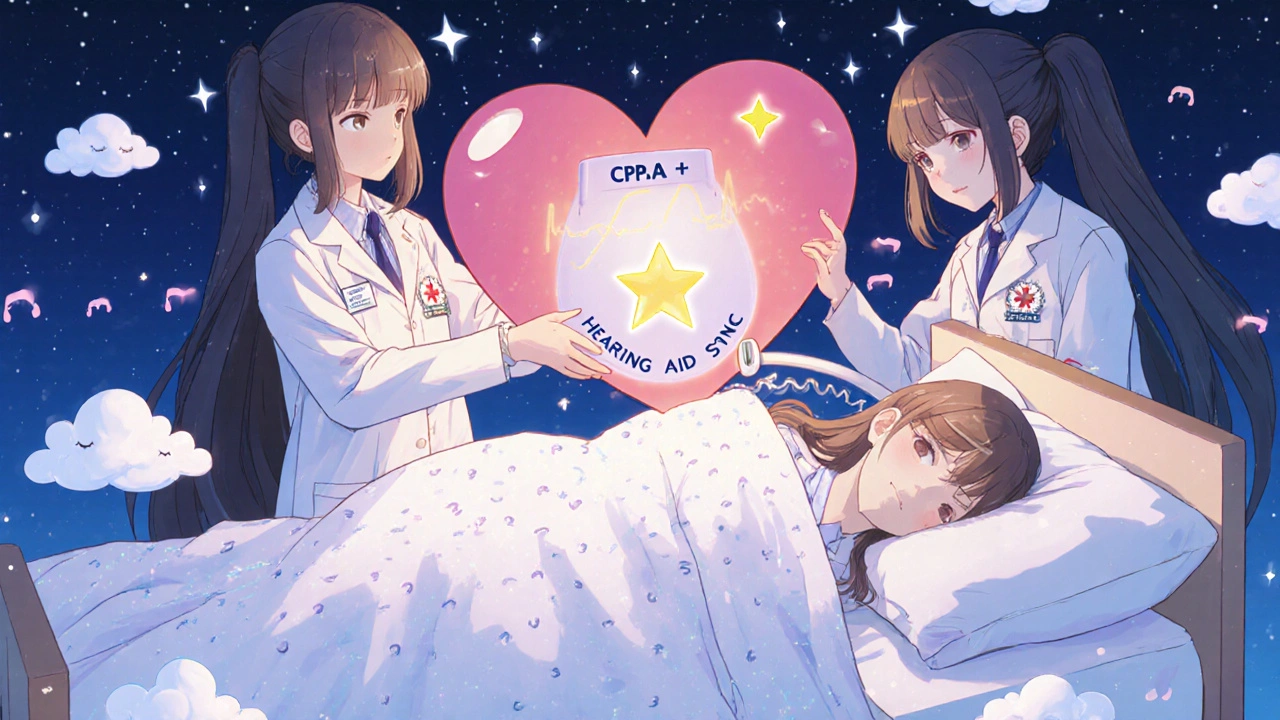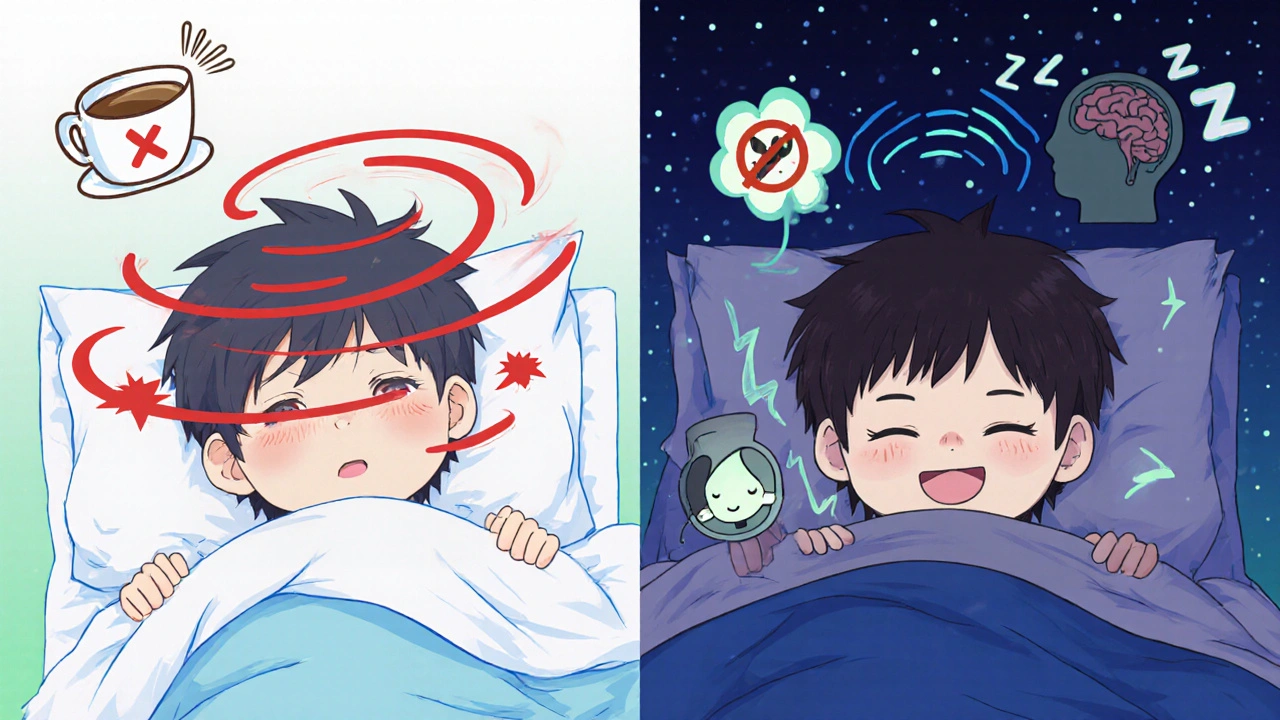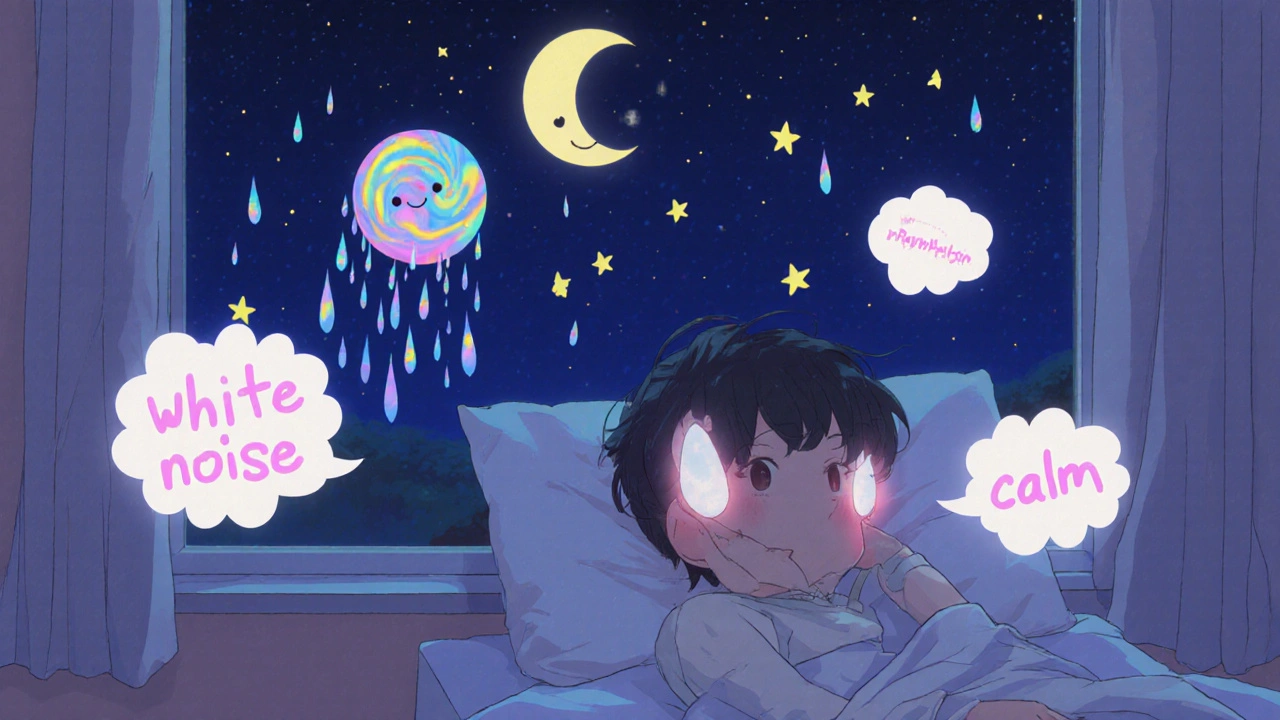Many people with hearing loss struggle to fall asleep-not because they’re stressed, but because their brains are still working overtime trying to hear what isn’t there. If you’ve ever lain awake at night, listening for silence that never comes, you’re not imagining it. There’s a real, measurable link between hearing loss and sleep disorders, and it’s more common than most doctors admit.
The Silent Night: How Hearing Loss Disrupts Sleep
When your ears stop picking up sounds clearly, your brain doesn’t just turn off the audio feed. Instead, it starts filling the gaps. This is called auditory deprivation. In quiet rooms-like bedrooms at night-your brain amplifies internal noise: blood rushing, muscles twitching, even the hum of your own breathing. For some, this turns into persistent ringing, known as tinnitus. Studies from the University of Michigan show that people with moderate to severe hearing loss are 50% more likely to report trouble falling or staying asleep than those with normal hearing.
It’s not just about noise. Hearing loss changes how your brain regulates sleep cycles. The auditory cortex, which normally processes sound, becomes hyperactive when deprived of input. This overactivity interferes with the brain’s ability to transition into deep sleep stages. Without deep sleep, your body doesn’t repair tissues, balance hormones, or clear brain waste properly. Over time, this leads to chronic fatigue, poor concentration, and even mood disorders.
The Vicious Cycle: Sleep Apnea and Hearing Loss
One of the most dangerous connections is between sleep apnea and hearing loss. Sleep apnea causes repeated breathing pauses during sleep, which lower oxygen levels and strain the cardiovascular system. Research from the University of Pennsylvania found that people with sleep apnea are 2.5 times more likely to have hearing loss, especially in low-frequency ranges.
Why? The same blood vessel damage that causes sleep apnea also harms the delicate hair cells in the inner ear. These cells don’t regenerate. Once they’re damaged, hearing loss becomes permanent. And here’s the twist: people with untreated sleep apnea often wake up gasping for air, disrupting their sleep even more. This leads to daytime drowsiness, which increases the risk of accidents and makes hearing aid use harder-because you’re too tired to manage them properly.
It’s a loop: hearing loss makes sleep worse, poor sleep worsens hearing, and both feed into other health problems like high blood pressure and depression.
Tinnitus: The Nocturnal Noise That Won’t Quit
Tinnitus-the perception of ringing, buzzing, or hissing without an external source-is the most common sleep disruptor linked to hearing loss. About 80% of people with chronic tinnitus say it gets louder at night. Why? Because daytime distractions fade. The quiet makes the noise feel louder, and your brain, already on alert from hearing loss, fixates on it.
Unlike temporary ringing after a concert, chronic tinnitus doesn’t fade. It lingers. And without proper management, it can become the main reason someone can’t fall asleep. A 2024 study in the Journal of Clinical Sleep Medicine found that tinnitus sufferers who used sound therapy before bed improved their sleep quality by 60% within six weeks. Simple tools like white noise machines, fans, or even apps playing gentle rain sounds helped their brains stop chasing the ringing.

What Works: Practical Fixes for Better Sleep
You don’t have to live with sleepless nights because of hearing loss. Here’s what actually helps, based on real patient outcomes and clinical trials:
- Use hearing aids at night-yes, even while sleeping. Modern hearing aids now have sleep modes that reduce amplification but still provide low-level background sound to prevent auditory deprivation. Brands like Phonak and Oticon offer models with built-in night sound programs.
- Try sound masking-a white noise machine or a fan set to low can drown out tinnitus. Don’t use headphones; they can irritate the ear canal. Stick to room-based sound sources.
- Get screened for sleep apnea-if you snore, wake up gasping, or feel exhausted despite 8 hours in bed, ask your doctor for a sleep study. Treating sleep apnea can improve both your hearing and your sleep.
- Reduce evening caffeine and alcohol-both worsen tinnitus and fragment sleep. Even one glass of wine after 6 p.m. can make nighttime ringing worse.
- Practice mindfulness or guided relaxation-apps like Calm or Headspace have specific programs for tinnitus-related insomnia. They train your brain to stop fighting the noise, which reduces the stress response that keeps you awake.
When to See a Specialist
If you’ve tried basic fixes and still can’t sleep, it’s time to see a team, not just one doctor. Look for an audiologist who works with sleep specialists. They’ll check for:
- Progressive hearing loss patterns
- Signs of obstructive sleep apnea
- Medication side effects that worsen tinnitus (like high-dose aspirin or certain antibiotics)
- Underlying conditions like diabetes or thyroid disorders that affect both hearing and sleep
Don’t wait until you’re exhausted all day. A 2023 study from Melbourne’s Royal Victorian Eye and Ear Hospital tracked 312 patients with combined hearing loss and insomnia. Those who received coordinated care-including hearing aids, CPAP therapy for apnea, and cognitive behavioral therapy for tinnitus-saw a 75% improvement in sleep quality within three months.

What Doesn’t Work
There are a lot of myths out there. Avoid these:
- Earplugs at night-they make the brain work harder to detect sound, making tinnitus louder.
- Alcohol as a sleep aid-it may help you fall asleep faster, but it fragments deep sleep and increases tinnitus.
- Ignoring the problem-hearing loss and sleep disorders don’t fix themselves. The longer you wait, the more your brain adapts to the noise, making it harder to retrain later.
Final Thought: It’s Not Just About Ears
Hearing loss doesn’t live in isolation. It’s tied to your heart, your brain, your stress levels, and your sleep. Treating it as just an ear problem misses the bigger picture. The best outcomes come when you treat the whole system-not just the hearing aid, not just the sleep mask, but both, together.
If you’re struggling to sleep because of ringing, silence, or fatigue, you’re not alone. And you don’t have to accept it as normal. With the right approach, better nights are possible-even with hearing loss.
Can hearing aids help me sleep better?
Yes, if they’re set up correctly. Modern hearing aids have night modes that provide low-level sound to prevent your brain from amplifying internal noise. They don’t need to be loud-just enough to give your auditory system something to focus on instead of tinnitus. Some models even include built-in white noise or nature sounds.
Is tinnitus always caused by hearing loss?
Not always, but it’s the most common cause. Other triggers include ear infections, jaw problems, certain medications, head injuries, or stress. However, if you have tinnitus and notice difficulty understanding speech in noisy places, you likely have some degree of hearing loss-even if it’s mild. A hearing test can confirm this.
Can sleep apnea cause hearing loss?
Yes. Repeated drops in oxygen during sleep apnea damage the tiny blood vessels in the inner ear. This leads to sensorineural hearing loss, often starting in low frequencies. Studies show that people with moderate to severe sleep apnea are more than twice as likely to have hearing loss compared to those without it. Treating the apnea can stop further damage.
Should I avoid silence at night if I have hearing loss?
Yes. Complete silence can make your brain hyperactive, worsening tinnitus and making sleep harder. Use a fan, white noise machine, or soft ambient sound. The goal isn’t to block noise-it’s to give your brain a gentle, consistent sound to focus on so it stops searching for something to hear.
Does using headphones at night make tinnitus worse?
Yes, especially if you’re listening to music or podcasts. Headphones press against the ear canal and can increase pressure and irritation. They also isolate you from ambient sound, which your brain may interpret as silence-triggering auditory deprivation. Stick to room-based sound sources like speakers or white noise machines instead.



Comments
Man, I never thought my buzzing ears were keeping me up. I just blamed it on coffee. Got a white noise app now and I’m actually sleeping through the night. Game changer.
While the clinical correlations presented are compelling, one must exercise caution in conflating association with causation. The bidirectional relationship between auditory deprivation and sleep architecture remains inadequately characterized in longitudinal studies. Furthermore, the efficacy of nocturnal hearing aid use has not been robustly validated in randomized controlled trials with sufficient power. One wonders whether the observed improvements stem from placebo effects or the mere presence of a ritualistic bedtime routine.
So let me get this straight… the brain’s just… making noise because it’s bored? Like a toddler screaming in the backseat? And we’re supposed to fix it with a fan? 🤦♂️
Also, hearing aids at night? Bro, I’m not paying $3K for a little speaker that plays ocean waves while I drool on my pillow. Next they’ll tell me to wear a CPAP mask while watching Netflix.
And why is no one talking about the fact that Big Hearing Aid is pushing this? I’m pretty sure my phone’s Bluetooth is what’s really causing the tinnitus. #CorporateConspiracy
I’ve been dealing with this for years… and honestly, the fan tip? Life-changing. I used to think I was just ‘a light sleeper.’ Turns out, my brain was screaming for something to listen to. I got a small Bluetooth speaker, set it to rain sounds, and now I sleep 7 hours straight. No more 3 a.m. panic about my own heartbeat. Thank you, whoever wrote this.
They don’t want you to know this, but the government installed silent frequency emitters in every bedroom to keep people docile. The ringing? It’s not tinnitus-it’s the signal. Hearing aids? They’re listening devices. Sleep apnea machines? They’re syncing your brainwaves. You think this is about health? No. It’s control. They’re harvesting your neural noise. Wake up. The silence isn’t empty-it’s encrypted.
Basic science. Hearing loss → brain overcompensates → tinnitus → sleep disruption. No magic. No conspiracy. Just biology. Use hearing aids. Use white noise. Stop drinking. Done. Stop overthinking.
hearing aids at night? lol. i tried once. fell asleep with em in and woke up with em in my ear canal. pain. just use earplugs. works better.
I’m from South Africa and we don’t have access to most of these devices, but I’ve found something that works: a small radio tuned to static. It’s not fancy, but it’s consistent. My neighbor thought I was crazy until he tried it himself-he said he hadn’t slept through the night in 12 years. It’s not about the tech, it’s about giving your brain a gentle anchor. Silence isn’t peaceful-it’s anxious. We need to reframe it as ‘sound therapy,’ not ‘noise.’ And honestly? The fact that we’re even having this conversation means we’re finally starting to see hearing loss as a whole-body issue, not just an ear thing. That’s progress.
OMG YES. 🥹 I had no idea my tinnitus was linked to sleep apnea until I got tested. I thought I was just ‘stressed.’ Now I use my CPAP + a little fan + no wine after 7. I’ve slept like a baby for 3 months straight. Thank you for writing this. I’m sharing it with my whole family. 💙
Neuroplasticity. The auditory cortex doesn’t ‘turn off.’ It rewires. The brain doesn’t hear silence-it creates phantom stimuli. This isn’t a sleep disorder. It’s a perceptual reorganization. The solution isn’t masking-it’s cognitive recalibration. Sound therapy is a band-aid. What we need is neurofeedback training. But no one wants to pay for that. So we buy fans.
They say hearing loss causes sleep problems. But what if it’s the other way around? What if modern life-LED screens, Wi-Fi, 24/7 noise pollution-is frying our inner ears, and the brain’s just reacting? The real culprit? The system. The 9-to-5 grind. The blue light. The anxiety. Hearing aids? A distraction. We need to unplug. Go live in the woods. Let your ears heal. Not with gadgets-with stillness. But they don’t want you to know that.
Why are you all listening to Western doctors? In Nigeria we know the truth-your ears are weak because you eat too much processed food and sit in AC all day. The real fix? Ginger tea. Sunlight. Walk barefoot on earth. Stop buying gadgets. Your brain is not broken. Your soul is tired. Sleep is not a machine to fix. It is a gift. Stop trying to engineer peace. Just rest.